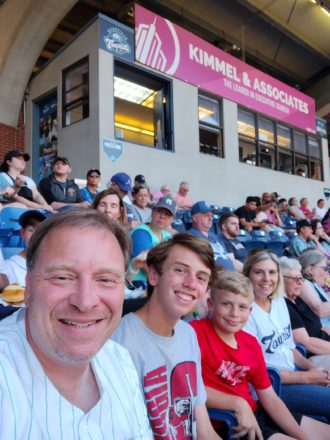No matter how many times she does it, Amanda Gentry still gets nervous whenever she sings “The Star-Spangled Banner” before Asheville Tourists baseball games.
To counter those emotions and keep herself grounded before stepping onto McCormick Field in front of 4,000 people, she’s developed a preperformance routine.
“I walk down to the stadium bathroom and have, like, five minutes to myself,” Gentry says. “I don’t have to go to the bathroom. I just go stand down there and gather my thoughts and get quiet.”
The ritual helps Gentry get in the right mindset to deliver a strong performance. Her consistency has also earned her a spot in the stable of reliable vocalists that the team’s promotions manager, Alyssa Quirk, and promotions assistant Tess Boatwright call on to lead off each home game. And with 66 such events each season, there’s the potential for a wide variety of voices.
Step right up
Every year on a Saturday in mid-March, the Tourists hold national anthem auditions at McCormick Field. The date is posted on the team’s website, promoted through social media and advertisements, and typically attracts enough candidates to warrant a four-hour window. One by one, the singers go through the song while Quirk, Boatwright and a few other judges take notes, prioritizing certain qualities.
“One of the big things, even though you’re singing into a microphone, is being able to project. You’re not facing the crowd, and it can be hard for some people to hear,” Boatwright says. “And second, it’s a respect thing, so making sure they’re doing normal national anthem things.”
She adds that singers aren’t required to be local, which leads to hopefuls driving in from as far as Charlotte to audition. Nearly everyone performs solo, but a few quartets and church choirs have made the cut, as well as the Asheville Gay Men’s Chorus.
Hearing the same song sung numerous times can result in a challenging day for the judges. But the repetitive and amplified nature of the tryout has also attracted impromptu participation. One afternoon in 2010, David Bradley‘s then 9-year-old son was playing an Asheville Buncombe Youth Soccer Association game at Memorial Stadium, just up the hill from McCormick Field. While there, the familiar tune grabbed the elder Bradley’s ear.
“[My wife and I] kept hearing the national anthem sung, like, 25 times while his soccer game was going on. And so we drove back down there to see what was going on, and they were having tryouts to sing,” Bradley says. “I didn’t know anything about it. I just ran in, found out what was going on and ran back out to my wife and son and said, ‘Hey, are y’all OK if I just run in there and do a test run real quick?’”
There was no wait at that point, so Bradley went in and sang. The Tourists’ reps told him they liked what they heard and would be in touch. Since then, he’s performed “The Star-Spangled Banner” at multiple games each season, as has Gentry.
Experience counts
Gentry and Bradley grew up singing in their respective churches and have a long history of performing the national anthem. Gentry sang it before multiple City of Asheville and Buncombe County ceremonies, and Bradley was frequently tapped to sing before basketball games while he was an undergraduate at King College (now King University) in Bristol, Tenn.

Bradley says the biggest detail that he keeps in mind when approaching “The Star-Spangled Banner” is that the word “free” — the song’s highest note, which awaits in its penultimate line, “O’er the land of the free” — is one octave higher than the “O” in the opening line “O say, can you see.”
“So, start the note that you think you’re going to start on, and then make sure that you can hit the octave higher,” he says. “If you can’t, you’re not in your good range [and should start on a lower note]. If you’ve ever heard somebody butcher the national anthem, they did not check that octave thing.”
Staying reverential to the song and its meaning is what steers each of Gentry’s performances. Her high school voice teacher instructed her to “just sing it the way it’s supposed to be sung,” and she’s followed that advice in the 22 years she’s been at McCormick Field and anywhere else she’s asked to lend her vocal talents.
“I don’t do anything weird that you’ll hear people do to it,” Gentry says. “I just sing it the way it has been written.”
Curveballs
Neither performer has heard any especially unusual renditions of “The Star-Spangled Banner” at McCormick Field, but Bradley recalls hearing several country-music-inspired versions at games he’s attended exclusively as a fan, as well as an instrumental quartet interpretation by the Montreat-based group The Tarnished Brass.
“And sometimes you get the really cool [experience] of hearing like a 6- or 7-year-old sing it, who’s got a heck of a voice,” Bradley says. “You’re just like, ‘Whoa!’ And even if they butcher it, you just go, ‘Hey, that’s a 6- or 7-year-old. That’s cool. What courage it took to get up and sing in front of that many people.’”
Every now and then, Bradley is tempted to toss in a vocal embellishment. But other than one instance when he followed his gut instinct and invited the crowd to sing with him, he resists messing with a straightforward approach.
“I’m not going to pull out a Whitney Houston version because I don’t have a Whitney Houston voice,” he says. “If I really tried to ham it up, my voice might crack — and I don’t think I want to do that when I’m trying to do the anthem.”
On the day of the performance, Bradley will refresh himself with the lyrics and say them aloud to himself, including while driving to the stadium.
“It’s a song that you do know, and so unless your nerves get the best of you, you’re going to be fine and you’re going to remember what the words are,” he says. “But sometimes, if I’m feeling worried about that day, I will have [the words] on my phone, down at my leg, just in case.”
In the initial minutes when he’s on the field, while the players are being introduced, Bradley uses the preperformance time to start breathing deeply. Then, once Boatwright or Quirk hands Bradley the microphone, he has the air support to start strong and get through the song with a consistent vocal sound.
“That’s kind of my ritual,” he says. “Maybe I’ll get a hot dog while I’m waiting before, but most of the time I wait to eat until afterward.”
Such refreshments are typically enjoyed with friends and family. Though national anthem singers are not paid for their services, they receive four complimentary tickets to the game in the reserved box seats close to home plate.
Veteran status
Singing the national anthem holds a special significance for Navy veteran and North Asheville resident Chuck Killian.
“It reminds me of what it’s all about,” he says. “It’s a big deal for me — it really is.”

While out on the field, he feels that he’s representing others who’ve served in the military, including those in the Buncombe County Veterans Treatment Court. A retired CPA, Killian is currently the treasurer for the organization, a voluntary, court-supervised, intensive treatment court for U.S. military veterans charged with misdemeanor, gross misdemeanor or felony offenses who are struggling with addiction, mental illness and/or co-occurring disorders.
Killian, who’s about to turn 79, has been performing “The Star-Spangled Banner” since the age of 13. He takes a straightforward approach to the song and strives to keep the tempo active.
Like Bradley, Killian says that finding a starting note that allows one to stay within his or her range is key to a successful rendition. And for his McCormick Field debut in 2018, he had a piano app ready on his phone to help him find that initial note.
However, the night also happened to be the one when the Tourists honored Crash Davis, the character played by Kevin Costner in Bull Durham, who ends his career in Asheville. Lured by free commemorative jerseys and other incentives, the capacity crowd gave Killian a particularly raucous welcome. The noise prevented him from hearing the app, but he did his best and powered through.
“I’m not sure what note I started on,” he recalls with a laugh. “I just had to make it up. I certainly have a top to my range, and you don’t want to start too high when you’re a bass.”
Professional advice
For those interested in auditioning for singing duties at McCormick Field, all three vocalists highly recommend lots of practice and seeking out opportunities to perform the national anthem at smaller functions rather than make one’s debut before a few thousand people at the ballpark.
Once you’re out on the field, back to the crowd and facing the outfield with a microphone in your hand, the immensity of the situation is bound to set in — but Gentry stresses that “you just have to tune it out.”
“I think you have to just get quiet in your head,” she says. “Some people want to close their eyes and find a happy place. For me, it’s fixating my eyes on the flag, and then I put my hand over my heart and just go with it. Once you start, there’s no going back.”
Gentry’s reliability has made her one of the Tourists’ top substitutes when other vocalists have had to reschedule. One time, she was given 20 minutes’ notice, walked in, sang and walked right back out. And she’d do it again if asked.
“To me, [singing is] a God-given talent, and if God gives you a talent to use, you might as well do it,” she says. “And if it’s the national anthem, I feel like it’s my civic duty.”




Before you comment
The comments section is here to provide a platform for civil dialogue on the issues we face together as a local community. Xpress is committed to offering this platform for all voices, but when the tone of the discussion gets nasty or strays off topic, we believe many people choose not to participate. Xpress editors are determined to moderate comments to ensure a constructive interchange is maintained. All comments judged not to be in keeping with the spirit of civil discourse will be removed and repeat violators will be banned. See here for our terms of service. Thank you for being part of this effort to promote respectful discussion.